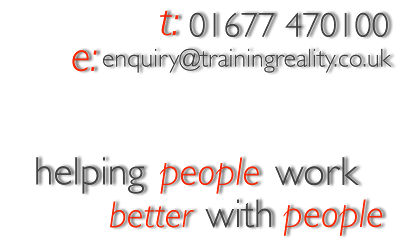Please press (at least!) one of these.
It costs you nothing, and (possibly) helps us spread the word!
...or being yourself, continued
Monday, 15 March 2010
We’ve reached the final part of this series of articles, which has covered the range of behaviours from utter conformity through to deliberately being different. The last article looked at the sweet-spot – authentic behaviour – from the point of view of the organisation. This, the last instalment, will look at it from the point of view of the individual.
For reference, previous articles in this series can be found here:
In order to explore the benefits of being authentically yourself within a team, company or organisation, I’m going to break down the analysis into different sections, as they each have rather different challenges and rewards.
As a leader
In leadership roles in organisations, whether at the very top of an enormous tree, or simply managing a small team, there can be a great deal of pressure to conform to a norm of “leadership”. The way you look, the way you act, the way you are: all of these things are much more on show than they were before you took on the leadership position, and it is therefore possible to feel that any slight discrepancy from the perceived norm will be picked on.
The most common occurrences of this pattern of behaviour are in the worlds of celebrity and politics. Politicians (and we’ll see a lot more of this in the run up to the election) are pressured into giving conformist responses to questions (see here for more on this) and behaving in a unified, uniform fashion. This is seen as the best approach.
I would argue that this shows astonishing naivety, especially if the non-political world is adopting this approach from politics. In everything other than incredibly short-term, restricted interactions, people will see through a pretence of conformity, and trust will be immediately eroded.
As a leader, you want (and need) to be trusted. Being yourself is the only way that can happen.
As a team member
As with leadership positions, there can be expectations of conformity in team member roles, and it is possible, at least in the short-term, to act as if you fit with the “team norm”. Two critical questions then arise:
As discussed in the last article in this series, one challenge for those trying to conform is to decide what they are actually conforming to. Just as there is no such thing in reality as the average person, there is no such thing in organisations as a single norm. You’re going to have to put a huge amount of effort in to being fully flexible and adaptable to fit in with such a changing, transient thing – but why bother?
Surely you were hired and brought onto the team for your innate skills, abilities, attitudes and aptitudes? Not for your acting skills. If you spend your time on a team simply fitting in with everyone else, what value are you really adding?
As a candidate
Most people, I’d hazard a guess, have had debates with themselves (and perhaps enrolled others in the decision making process) about what to wear, what to say, and how to act in an interview situation. I’d hate to remove this questioning altogether, but…
Be yourself, because you won’t succeed in the long-term unless you are. Take time, pains and care to be the best that you can be, but not to be something you’re not.
If you get a job on the basis of what is essentially a lie – being someone else – it’ll be discovered by your employer, or by you, sooner or later. You’ve wasted your time and theirs.
Long-term development
If you think that life is a bit of a journey, and that you grow, develop, learn and change along the way, then hampering that learning experience by putting artificial filters between you and the world is a rather odd choice to make. The most important thing we can learn about through life is ourselves – who we really are, how we interrelate with others, and the impact we can have on the world around us. How on earth can we learn about ourselves if we don’t allow ourselves to be ourselves?
Happiness
And finally…to my mind, the single most important individual objective of all. Pretending to be something you’re not might work for some people some of the time, but I seriously, genuinely doubt whether it can deliver the most important thing of all – long-term happiness.
Please press (at least!) one of these.
It costs you nothing, and (possibly) helps us spread the word!



